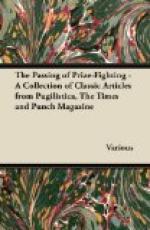Of Buttons.—In these days of innovation—when Brummagem button-makers affect a taste and elaboration of design—a true gentleman should be most careful in the selection of this dulce et utile contrivance. Buttons which resemble gilt acidulated drops, or ratafia cakes, or those which are illustrative of the national emblems—the rose, shamrock, and thistle tied together like a bunch of faded watercresses, or those which are commemorative of coronations, royal marriages, births, and christenings, chartist liberations, the success of liberal measures, and such like occasions, or those which would serve for vignettes for the Sporting Magazine, or those which at a distance bear some resemblance to the royal arms, but which, upon closer inspection, prove to be bunches of endive, surmounted by a crown which the Herald’s College does not recognise, or those which have certain letters upon them, as the initials of clubs which are never heard of in St. James’s, as the U.S.C.—the Universal Shopmen’s Club; T.Y.C.—the Young Tailors’ Club; L.S.D.—the Linen Drapers’ Society—and the like. All these are to be fashionably eschewed. The regimental, the various hunts, the yacht clubs, and the basket pattern, are the only buttons of Birmingham birth which can be allowed to associate with the button-holes of a gentleman.
The restrictions on silk buttons are confined chiefly to magnitude. They must not be so large as an opera ticket, nor so small as a silver penny.
Of Braids.—This ornament, when worn in the street, is patronised exclusively by Polish refugees, theatrical Jews, opera-dancers, and boarding-house fortune-hunters.
Of Mustachios.—The mustachio depends for its effect entirely upon its adaptation to the expression of the features of the wearer. The small, or moustache a la chinoise, should only appear in conjunction with Tussaud, or waxwork complexions, and then only provided the teeth are excellent; for should the dental conformation be of the same tint, the mustachios would only provoke observation. The German, or full hearth-brush, should be associated with what Mr. Ducrow would designate a “cream,” and everybody else a drab countenance, and should never be resorted to, except in conformity with regimental requisitions, or for the capture of an Irish widow, as they are generally indigenous to Boulogne and the Bench, and are known amongst tailors and that class of clothier victims as “bad debts,” or “the insolvency regulation,” and operate with them as an insuperable bar to
[Illustration: PASSING A BILL.]
The perfect, or heart-meshes, are those in which each particular hair has its particular place, and must be of a silky texture, and not of a bristly consistency, like a worn-out tooth-brush. Neither must they be of a bright red, bearing a striking resemblance to two young spring radishes.
The barbe au bonc, or Muntzian fringe, should only be worn when a gentleman is desirous of obtaining notoriety, and prefers trusting to his external embellishments in preference to his intellectual acquirements.




